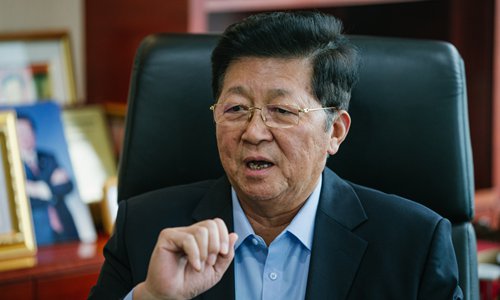HOME >> BUSINESS
‘Godfather’ of real estate industry warns of danger of restrictive policies amid China-US trade war
By Chu Daye Source:Global Times Published: 2019/7/10 17:33:40
Policies curb domestic demand amid China-US trade war

Meng Xiaosu Photo: Li Hao/GT
A key figure in China's real estate market reforms in the 1990s has suggested the country abandon restrictive policies that are strangling domestic demand, at a time when it's most necessary due to the ongoing China-US trade war.
Meng Xiaosu, dubbed the "Godfather" of China's real estate industry because of his leading role in drafting China's property reform policies transferring of home ownership rights from the state to individuals, warned of the risk of continuing restrictions in sectors such as the all-important real estate market and the auto market.
"Whether a trade war or a technology war, the Trump administration launched its relentless attack on Chinese economy that China cannot equally retaliate," Meng, who served as secretary to former vice premier Wan Li, a reform and opening-up pioneer, told the Global Times at his office in Beijing's Central Business District.
"It is in this critical sense that China should tap its domestic demand - its ultimate response to a US-waged trade and tariff war - as such measures will entice multinational companies to expand in the Chinese market," Meng said, gazing at the glistening China World Trade Center Tower across the street.
"A vibrant domestic market full of unmet demand will make foreign companies drool - this is China's best trade war weapon," Meng said.
China and the US have been locked in a trade war for more than a year. Although the two countries agreed to resume halted trade talks at the end of June, the US maintains tariffs on nearly half of its imports from China.
"Sadly, we see there are some restrictive policies preventing the vast power of domestic demand from being unleashed" in key sectors, noted Meng.
The property market contributes about 10 percent of GDP growth, while vehicle sales account for about 10 percent of total retail sales.
Using restrictive policies to curb home buying is the wrong approach, Meng said.
Chinese cities have cyclically used restrictive policies, from insisting that certain conditions be met to enable people to buy property, to curbing the number of homes people can own, as a means to rein in home prices.
Such policies have disturbed the natural growth of Chinese cities, curbing domestic demand in a wide array of sectors from steel and cement to coal and electricity, Meng said.
Besides practical hurdles, there are also top-down restrictions that have curbed supply. Taking Hong Kong as an example, cities in the Chinese mainland only developed some 20 percent of land within their jurisdiction, just like Hong Kong, keeping vast areas out of the real estate supply pipeline, according to Meng.
By contrast, metropolitan Tokyo has more urban built area than all six Chinese top-tier cities and municipalities combined, Meng said, who is now chairman of Huili Investment Fund Management Co.
Meng is not the only critic of restrictive policies. Li Daokui, a leading macroeconomist from Tsinghua University, has slammed policies enacted by some local governments that mandate stricter emission standard vehicles, which is discouraging consumers from buying cars.
Some local governments won't issue licenses to national V level cars, even though China cannot produce national VI level cars at the moment, and this is directly harming car consumption, Li said at a recent seminar.
Meng dismissed the likelihood of Chinese cities experiencing a Tokyo-style bursting of a property bubble, saying that the low level of urbanization in China means it is too early for such worries to be worthy of serious discussion.
But he did share concerns that many Chinese individuals' assets are predominantly tied up in home ownership, though he disagreed with proposed measures to rebalance the wealth structure.
"Many advocate shrinking the amount of wealth that people have in home ownership wealth so the proportion of financial assets may be lifted. This reductive thinking won't work," Meng said.
Meng said that expansive thinking, such as reverse mortgages, which gives financial resources to senior citizens and real estate investment trusts, which would monetize dormant urban properties, are the right methods to address the imbalance.
Newspaper headline: ‘Godfather’ of property criticizes curbs
Posted in: INDUSTRIES,ECONOMY,BIZ FOCUS